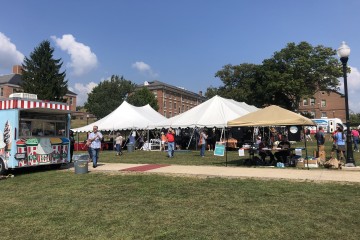Literacy and Democracy: How to Make Sense of Fake News
Roundtable Discussion Held to Facilitate Dialogue
On April 24, 2017, a roundtable discussion was held as joint efforts from the Lewis J. Ort Library and the departments of Communication, Computer Science, English, Geography, Philosophy and Political Science.
Each department sent an “expert” on the topics of alternative facts, fake news, and social media bubbles. All of which are hot topics with the current federal administration and discussion in the news. Department “experts” included Lisa Hartman from the Ort Library, Dr. Brian Hough from the department of Communication, Dr. Michael Flinn from the Computer Science and Information Technologies Department, Professor Andy Duncan from the English and Foreign Languages Department, Dr. Matthew Ramspott from the Geography Department, Dr. Michael Mathias from the Philosophy Department, and Professor Tim Magrath from the Political Science department. Randy Lowe from the Ort Libary and Dr. Elesha Ruminski from the department of Communication served as moderators for the discussion. Other faculty members were in attendance as well as a handful of students.
The discussion started off with the question of “Why is this an important topic today?” Dr. John Lombardi, who was in attendance, immediately started off explaining how news makes it to everyone across the country, and that it was a fundamental principle of our country. Anyone who wanted to share an opinion was welcome to as the moderators moved around the table.
Other questions were asked to encourage more discussion as the table talked about how to find facts and evaluate those facts. The question about how journalism traditional roles as changed was asked as well. This question spiked discussion as this is a topic that is constantly being challenged by the current federal administration. Charles Schelle from the News and Media Services department talked about how “the traditional role of being the gatekeeper is being challenged.” Professor Tim Magrath also talked about the selling of unbiased facts, and how the lack of reading newspapers is shifting the traditional journalism roles to what we are seeing today.
Professor Andy Duncan chimed in on the topic as well, explaining that people have more publishing power than ever now with the technology that one person can carry around in their pocket. He continued to explain that everyone can be a journalist; if you share it, you are a journalist.
As the roundtable discussion closed Dr. Ruminski encouraged the conversation to continue even as the event was closing. The dialogue about these issues can help improve things around us, and even on our campus.




